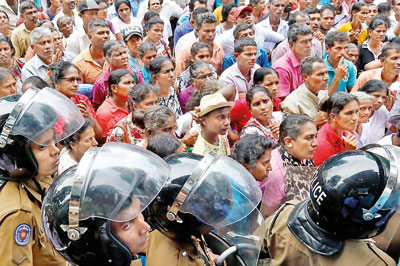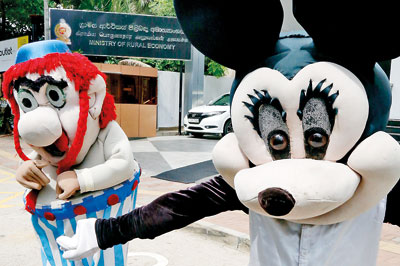News
State-run Milco in a muddle owing millions to farmers
A leading state-owned dairy producer, Milk Industries of Lanka Company, or Milco has for years not been able to manage its liquidity risk — not having cash to meet its financial commitments — and once again, it owes million of rupees to its supplier famers. Milco, however says it is awaiting billions of rupees in handouts from the government.

Dairy farmers stage a protest.
Dairy farmers who supply milk to Milco, say, they are owed millions by the company and are selling their produce elsewhere. The National Centre for Protecting Dairy Farmers (NCPDF) said dairy farmers have no other alternative but to sell their produce elsewhere even at a lower price.
NCPDF organiser, Susantha Kumara Navaratne, said that Milco has not paid dairy farmers for more than four weeks beginning June 15. Payments have been made to districts with fewer farmers since June following agitations, but those districts in which there is a high population of farmers have not yet been paid and this includes Rs 70 million in Anuradhapura, Rs 50m in Kurunegala and Rs 35m in Polonnaruwa.
“These farmers have started selling their milk to other dairy companies including Cargills and Pelawatte, although they receive less for a litre,” he said.
The general manager for administration at Milco (Pvt) Ltd , M A S Sudath, dismissed rumours that the company is being targeted by the government for privatisation.
He said Milco (Pvt) Ltd had been promised Rs 4.2 billion from the Treasury and the farmers could be paid when the money is available. “There is a delay in the administrative work, we will get it in another two weeks,’’ he said.
Explaining the reasons that led to the crisis he said that the company has being paying dairy farmers from its revenue. But in the last two years, he said a considerable amount had been spent on investment projects. “Now we have no reserves and have overdrawn our account.”
“We upgraded our milk powder plant at Ambewela with new infrastructure facilities at a cost of Rs 450 million,” he said. In the past, presidential contenders repeatedly made promises in their election manifesto to reduce the price of milk powder. “This government subsidised Milco milk powder by Rs 30 for a 400 gram pack and Rs 75 for a kilogram pack after the presidential election in 2015,” he said.
“We buy from farmers at high rates because of governments promising the dairy farmers higher prices for liquid milk. They may go to other dairy companies but will come back to us,’’’ he said. Milco pays up to Rs 65 per litre. The company, he said, lacks a proper chilling and processing facility and was forced to throw away large quantities of liquid milk. “In 2012, 2016, and in 2017 milk collected from farmers was thrown away,” he said.

Right: the company engaging a promotion campaign. Pic by M.A. Pushpa Kumara
Liquid milk is collected from 375,000 dairy farmers countrywide but since Milco’s powdered milk does not compare with imported milk powder it has no demand locally. Also, it has been found that more dairy companies are finding it cheaper to use imported powdered milk for their products. Hence the demand for liquid milk is sliding down.
The government in 2017 drew up a plan to import 20,000 high yielding milch cows from Australia and New Zealand to be distributed among dairy farmers. Mr. Navaratne of the NCPDF said the government’s move to boost milk production locally has been a failure as the cattle were not yielding the promised quantities of milk. “They have only brought bacterial and viral diseases that are spreading among the local cattle,” he said.
In the first stage, 4,000 Friesian, Jersey, and hybrid milk cows were imported from New Zealand and distributed to National Livestock Development Board farms at Ridiyagama, Bopatalawa and Diyagama.In December 2017, a further 3,000 high yielding milch cows were imported from Australia and distributed among 50 middle-scale entrepreneurs in Nuwara Eliya, Matale, Kandy, Kurunegala and Badulla districts.
“If given the same care, local cattle will yield more and our industry will flourish,” he claimed. The former head of the Department of Livestock Development, Professor H W Cyril, told the SundayTimes that the government needs to draw up a proper plan to control substandard small-scale dairies by providing incentives to middle and large-scale farmers.
He said the government should set up such industries and when they are established hand them over to the private sector with a 51% stake holding. “Support local farmers. This will give youth employment in the dairy sector promoting commercial farming.’’
It is estimated that Sri Lanka spends over Rs 40 billion on imports of powdered milk and the bulk is used by manufacturers in producing flavoured milk, yoghurt, ice cream and other dairy products.
Research shows that the demand for milk is growing at 13% a year but only 30% of our dairy demand is being met locally. Of this 80% is produced by small-scale farmers.
As Sri Lankans only can afford to have just a quarter of the recommended dairy intake milk collected goes wasted. Lack of refrigeration facilities in rural homes is also a contributing factor to the waste.
Also research point out that the one litre pack is too large and expensive (at Rs 200 to Rs 220 a litre) for the rural wage earner. To counter this small packs can be introduced and sold in schools promoting the habit of drinking milk.
Also Sri Lanka needs to revisit its strategy in feeding cattle because unlike in the past land for grazing is becoming scarce.
The solution is to bring the feed to the animals. “In this way we can feed more animals and they can be kept in an enclosed space,’’ Prof Cyril said. Grass can be grown in the dry zone and brought to the wet zone, as the imported animals need cooler climates, he said.

